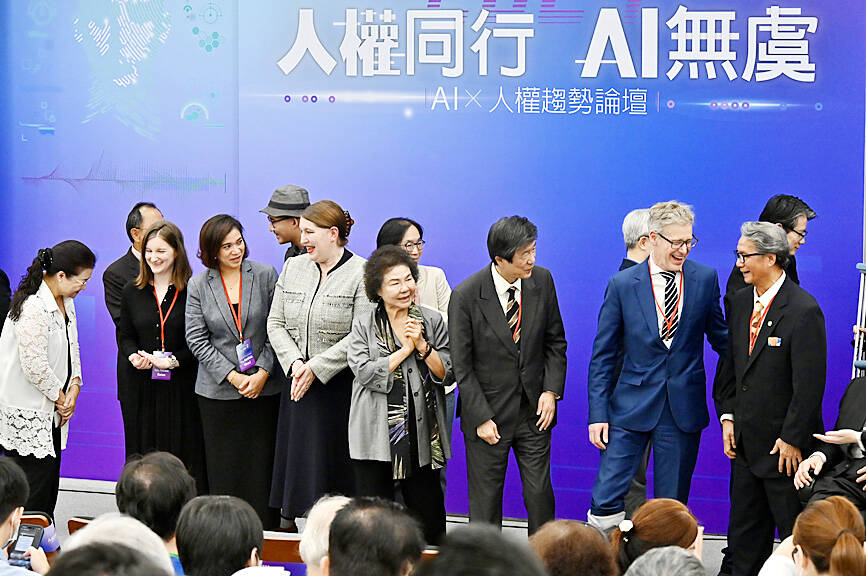Taiwan must be ready for the dangers posed by generative artificial intelligence (AI) to human rights and freedoms, National Human Rights Commission Chairwoman Chen Chu (陳菊) said yesterday.
The commission considers AI-related challenges to human rights a matter of priority, while giving due credit to the convenience and productivity benefits stemming from the technology, she told a conference in Taipei on human rights.
Citing the Office of the UN High Commissioner for Human Rights, Chen said that algorithmic technology has been linked to certain adverse effects on rights and disadvantaged groups.

Photo: George Tsorng, Taipei Times
AI-generated disinformation undermines the foundations of speech freedom by attacking the human capacity to think freely, conceptualize unique ideas and hold freely formed personal beliefs, Chen said.
Disinformation’s spread is especially pernicious to the ability of free people to make considered judgements on public affairs, she said.
AI is also accelerating automation in sectors that traditionally employ disadvantaged groups, worsening poverty and social inequality, Chen said.
Algorithms have extensively been used to generate images harmful to women and children, including materials portraying sexual violence and deepfakes created without the consent of the subjects they depicted, she said.
Children, lacking media literacy to discern bot-generated content, have become more vulnerable to negative influence than before due to AI technology, she said.
Taiwan has to recognize the human rights threat posed by generative AI and take steps to prevent abuses, she said.
She said a recent study conducted by the UN commission showed that 75 percent of respondents revealed personal information while interacting with chatbots and worry that these interactions compromised their privacy.
The survey also showed that 61.7 percent of respondents reported experiencing erroneous, inappropriate or discriminatory content created by an AI tool, she said.
About 90 percent of respondents agreed that more conversations should be included in the development of generative AI to protect the representation of disadvantaged minority groups, she said.
In addition, about 80 percent of respondents agreed that governments should regulate or supervise the research and development of the technology to guard against potential harm to human rights, she said.
As a free and democratic nation, Taiwan must ensure its generative AI technology would respect the values of human dignity and free development of personality, and not be applied in ways that impede freedom, Chen said.

CHANGING LANDSCAPE: Many of the part-time programs for educators were no longer needed, as many teachers obtain a graduate degree before joining the workforce, experts said Taiwanese universities this year canceled 86 programs, Ministry of Education data showed, with educators attributing the closures to the nation’s low birthrate as well as shifting trends. Fifty-three of the shuttered programs were part-time postgraduate degree programs, about 62 percent of the total, the most in the past five years, the data showed. National Taiwan Normal University (NTNU) discontinued the most part-time master’s programs, at 16: chemistry, life science, earth science, physics, fine arts, music, special education, health promotion and health education, educational psychology and counseling, education, design, Chinese as a second language, library and information sciences, mechatronics engineering, history, physical education

The Chinese military has boosted its capability to fight at a high tempo using the element of surprise and new technology, the Ministry of National Defense said in the Quadrennial Defense Review (QDR) published on Monday last week. The ministry highlighted Chinese People’s Liberation Army (PLA) developments showing significant changes in Beijing’s strategy for war on Taiwan. The PLA has made significant headway in building capabilities for all-weather, multi-domain intelligence, surveillance, operational control and a joint air-sea blockade against Taiwan’s lines of communication, it said. The PLA has also improved its capabilities in direct amphibious assault operations aimed at seizing strategically important beaches,

‘MALIGN PURPOSE’: Governments around the world conduct espionage operations, but China’s is different, as its ultimate goal is annexation, a think tank head said Taiwan is facing a growing existential threat from its own people spying for China, experts said, as the government seeks to toughen measures to stop Beijing’s infiltration efforts and deter Taiwanese turncoats. While Beijing and Taipei have been spying on each other for years, experts said that espionage posed a bigger threat to Taiwan due to the risk of a Chinese attack. Taiwan’s intelligence agency said China used “diverse channels and tactics” to infiltrate the nation’s military, government agencies and pro-China organizations. The main targets were retired and active members of the military, persuaded by money, blackmail or pro-China ideology to steal

The High Prosecutors’ Office yesterday withdrew an appeal against the acquittal of a former bank manager 22 years after his death, marking Taiwan’s first instance of prosecutors rendering posthumous justice to a wrongfully convicted defendant. Chu Ching-en (諸慶恩) — formerly a manager at the Taipei branch of BNP Paribas — was in 1999 accused by Weng Mao-chung (翁茂鍾), then-president of Chia Her Industrial Co, of forging a request for a fixed deposit of US$10 million by I-Hwa Industrial Co, a subsidiary of Chia Her, which was used as collateral. Chu was ruled not guilty in the first trial, but was found guilty